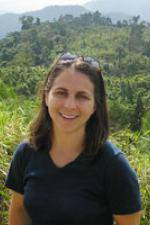
Lansing, Stephanie
Anaerobic digesters use animal, human or plant waste materials to create renewable energy (methane ‘biogas’) and an improved fertilizer while reducing water pollution, greenhouse gas emissions, and odor. In a plug-flow digester, wastewater flows through an enclosed tubular geomembrane bag. This environment has little to no oxygen and is optimal for microorganisms that use the wastewater as a nutrient source to produce methane-biogas. This biogas can be used directly for heating or cooking, or can be used to power an electric generator. During the digestion process, solids, organic matter and pathogens are drastically reduced while nutrients are retained, resulting in a high-value liquid fertilizer that is safer for the environment.
Our research focuses on the development of low-cost digestion systems that can be used by small to medium-scale farmers both in the United States and the developing world. Low-cost anaerobic digestion is a widely-used technology in developing countries, with 10 million low-cost digesters in India, China, and Latin America. The approximately 100 agricultural digesters in the United States are capital and management-intensive systems. With an average cost of $1.0 million, these digesters are inaccessible to medium and small-scale farmers. Due to capital requirements, the U.S. EPA recommends digester installation for herds with more than 500 cows, which puts this beneficial technology out of the hands of 94 % of Maryland dairies which have less than 200 dairy cows. With low-cost digesters these dairy farmers, as well as swine and poultry facility operators, could greatly benefit from the environmental and economic benefits of anaerobic digestion.
Our current research is focused enhancing the benefits of low-cost digestion systems, with research sites using dairy agricultural digesters in Maryland, dairy and swine agricultural digesters in Costa Rica, and human waste digesters in Haiti. In addition, we utilize ecological modeling to understand carbon and nutrient cycling in waste treatment systems at different scales and energy analysis using “emergy” language to quantify the environmental costs and benefits of low-cost waste treatment systems.